HOUSE OF PLEASURES (L'Apollonide Souvenirs de la maison close) (2011)
Genre: Drama
Director: Bertrand Bonello
Cast: Hafsia Herzi, Céline Sallette, Jasmine Trinca, Adele Haenel, Alice Barnole, Iliana Zabeth, Noémie Lvovsky
Runtime: 2 hrs 2 mins
Rating: R21 (Nudity and Sexual Scenes)
Released By: Shaw
Official Website:
Opening Day: 26 April 2012
Synopsis: The dawn of the XXth century: L'Apollonide, a house of tolerance, is living its last days. In this closed world, where some men fall in love and others become viciously harmful, the girls share their secrets, their fears, their joys and their pains...
Movie Review:
No matter the titillating title, writer/director Bertrand Bonello’s ‘House of Pleasures’ doesn’t hope to pleasure its audience by pandering to their baser instincts through a flesh parade of its predominantly female cast. Instead, Bonello mounts a sombre look at the daily lives and routines of the prostitutes within the walls of the Appolonide, an upmarket Paris brothel for middle-class men at the turn of the 19th century. The pace is slow and languid- consider this fair warning for less patient viewers- but if you allow it, the movie will reel you in with its hypnotic charm and leave you wondering about the people behind the world’s oldest profession.
Filmed with a deliberate dispassion throughout, Bonello flits from one character to another, never making one the central figure in the movie. Among those we get to recognise are Clotilde (Celine Sallette), a twelve-year veteran of the trade at just 28 years old who has recently grown increasingly disillusioned and dependent on opium; Pauline (Iliana Zabeth), the youngest at just 16 who enters the trade in a misguided attempt at asserting her own independence; and the middle-aged Madam (Noémie Lvovsky) who runs the house faced with foreclosure due to rising rent prices.
Yes, Appolonide is far from a cocoon for the girls, and Bonello places two stark characters as a sobering reminder of that- the first in the form of a cheerful girl Julie (Jasmine Trinca) who discovers one day during a routine medical examination that she has syphilis; and the second in Madeleine (Alice Barnole), who is permanently disfigured when a client (Laurent Lacotte) she dreams of having a future with ties her to the bed and slashes her from both corners of the mouth. Madeleine is the most blatant Bonello gets at eliciting his audience’s empathy for these women- and certainly, it’s hard not to be moved when she is nicknamed ‘The Woman Who Laughs’ and becomes no more than an object of fascination for others to gawk at.
Notwithstanding Madeleine’s misfortune, there is little to cheer about for any of the other girls trapped with little hope of escaping their circumstance. Though visited by regulars with sweet words and buoyant promises, there is little illusion that none of these men are serious about their affections for the ladies they frequent, using them as mere vessels to act out their fantasies- one girl is made to act like a mechanical doll; while another is dressed in a kimono and asked to speak Japanese even though she knows not the language. We know better than to believe their lies and empty promises, but who can blame some of the ladies for being optimistic- what else after all do they have to live for?
Setting most of the film within the four walls of the Appolonide and emphasising the day in and day our rituals of the women within adds to the claustrophobic feel of the movie, which of course reinforces the cheerless nature of their situation- there is also a reference to the conventional wisdom of the day, which equates their status to that of criminals by virtue of the size of their heads. The rare scene where the girls have the most fun is a daytime excursion they take to the countryside, which unsurprisingly shows them at their most lively and vivacious.
And indeed, there is very little to cheer or find pleasure in- despite the movie’s title- once one has observed the lives of these women in the Appolonide. The film is also purposefully set at the twilight of the industry in that form, and from time to time, Bonello hints at the imminent passing of a Parisian cultural icon. His parting shot is that of modern-day Paris, where prostitutes are standing by the street waiting for some random guy in a car to pick them up. Has society progressed in the past century? As long as there remain women who are stuck in the circumstance as those in the Appolonide, the answer quite honestly is a sobering no.
Movie Rating:




(Don’t be fooled by its title- rather than just a softcore porn flick masquerading as art, this is an unusually thoughtful and sobering look at the lives of a group of women trapped in the trade of satisfying men’s sexual desires)
Review by Gabriel Chong
You might also like:
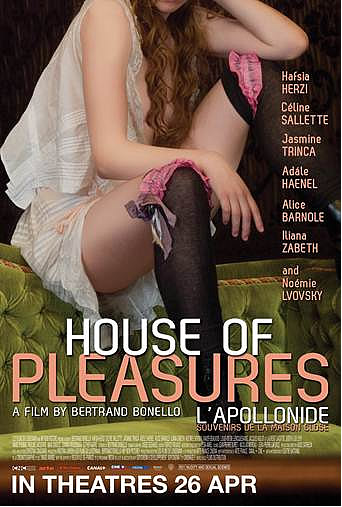 |
Movie Stills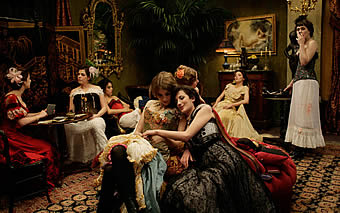 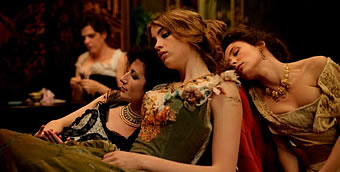 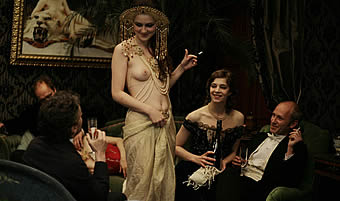 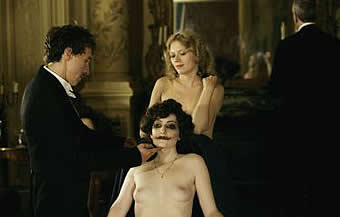 |




